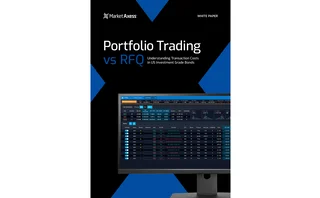Open Platform: Compliance Challenges for Communications

While the main part of the Dodd-Frank Act is concerned with regulating the swaps market, a section stipulates the recording of all trade-related communications by traders active in the swaps market trading with, or in, the US. March 2012 was the first of several significant dates for those concerned with recording. Investment advisors with more than 15 US citizens as customers were required to register with the Securities and Exchange Commission (SEC). By March 2013, companies had to comply with the call-recording legislation, both fixed line and mobile, for their swaps transactions.
Game Over
In the future, the US Commodity Futures Trading Commission (CFTC) will request the electronic records that relate to a transaction, rather than specific message types, or those of a named custodian. If a firm used Twitter to communicate about the transaction, then they will have to provide these records without being specifically asked for their tweets. Firms are now responsible for knowing all communication methods across transactions, and retrieving them in a way that allows the ‘reconstruction' of the communication, both pre- and post-trade.
Suggestions that e-mails, Bloomberg messages and telephone conversations would have to be tagged with the transaction ID were initially considered. However, following CFTC clarification in January 2013, the industry worked with vendors to formulate workflows that enable a regulated firm to recover communications with a particular counterparty, and then narrow the scope to a particular trade.
US regulators issued guidance regarding instant messaging and social media several years ago, and regulated European and Asian firms may have to tighten policies on permitted communication methods to ensure all relevant records are captured. Public instant messaging, Skype and proprietary messaging platforms are likely to decline in this space due to the difficulties of maintaining a ‘complete and accurate record', as firms must now record all media used for business communications.
Storing and Retrieving Data
In the US, mobile recording has not been the norm, and systems have not been designed to cope with the massive increase in volume that tracking mobile and voice in conjunction with email conversations will bring.
The expectation is that global regulators will apply the discretion granted to them under their requirements, when requesting record keepers to produce communications. The CFTC published its final rule in November 2012, where it stated its continued support for flexibility or ‘discretion', in likely recognition that recovering electronically stored data among such vast quantities will be challenging for firms. However, CFTC requests should be prioritized and responded to immediately, to reflect both their importance and urgency.
Public instant messaging, Skype and proprietary messaging platforms are likely to decline in this space due to the difficulties of maintaining a ‘complete and accurate record', as firms must now record all media used for business communications.
Retention periods have also been widely discussed, and adding fixed line and mobile calls to requirements raised concerns around the volume of data requiring storage. However, the final rule stipulates that recordings must be retained for just one year, which will allow the industry to gradually adjust their approach to records retention, search and speech-analysis technology.
The ability to search for keywords and phrases has been an integral part of the compliance officer's monitoring and retrieval process─regular searching of users' email, Bloomberg and other text-based messages is now commoditized, and forms part of almost all retention platforms. However, the ability to search for keywords in voice recordings and integrate them within the lifecycle of a specific trade is a challenge that compliance officers are about to face. How does a tool adjust or allow for context, for instance?
Banks are now starting to deploy systems to allow them to meet the challenges of increased retention and retrieval challenges. A correctly deployed and targeted system is able to increase productivity and reduce false positives for the monitoring and retrieval of messages. But a system has to be sufficiently flexible to meet the as yet unknown challenges of other regulations as they filter down, including the Markets in Financial Instruments Directive (MiFID II) and Market Abuse Directive II (MAD II).
Responsibility Shifts to the Regulated
Today's new environment shows a marked shift of responsibility from the regulator to the regulated. Until now, the onus for understanding communications media used in the negotiation of each transaction was firmly with the authorities, with requests often media-specific, and targeting individuals, rather than transactions. However, the sea change in the processing, analysis and recovery of data retained by regulated firms is happening now. The Dodd-Frank Act, and the interpretation of the ‘intention' of the rules by the CFTC, means firms must produce communication records relating to specific transactions, and in the future, the industry should expect to see requests that target individual trades.
Making sure that systems are flexible enough to handle these requests is one of the steps towards banks safeguarding themselves against a repeat of the 2008 crisis.
Robert Powell is the global head of compliance at Etrali Trading Solutions. The views expressed are those of the author, and do not necessarily represent those of either Waters or Etrali Trading Solutions.
Only users who have a paid subscription or are part of a corporate subscription are able to print or copy content.
To access these options, along with all other subscription benefits, please contact info@waterstechnology.com or view our subscription options here: http://subscriptions.waterstechnology.com/subscribe
You are currently unable to print this content. Please contact info@waterstechnology.com to find out more.
You are currently unable to copy this content. Please contact info@waterstechnology.com to find out more.
Copyright Infopro Digital Limited. All rights reserved.
As outlined in our terms and conditions, https://www.infopro-digital.com/terms-and-conditions/subscriptions/ (point 2.4), printing is limited to a single copy.
If you would like to purchase additional rights please email info@waterstechnology.com
Copyright Infopro Digital Limited. All rights reserved.
You may share this content using our article tools. As outlined in our terms and conditions, https://www.infopro-digital.com/terms-and-conditions/subscriptions/ (clause 2.4), an Authorised User may only make one copy of the materials for their own personal use. You must also comply with the restrictions in clause 2.5.
If you would like to purchase additional rights please email info@waterstechnology.com
More on Trading Tech
DORA flood pitches banks against vendors
Firms ask vendors for late addendums sometimes unrelated to resiliency, requiring renegotiation
IPC’s C-suite shuffle signals bigger changes for trader voice tech
Waters Wrap: After a series of personnel changes at the legacy provider, WatersTechnology examines what these moves might mean for the future of turrets and trader voice.
WatersTechnology latest edition
Check out our latest edition, plus more than 12 years of our best content.
From no chance to no brainer: Inside outsourced trading’s buy-side charm offensive
Previously regarded with hesitancy and suspicion by the buy side, four asset managers explain their reasons for embracing outsourced trading.
Band-aids vs build-outs: Best practices for exchange software migrations
Heetesh Rawal writes that legacy exchange systems are under pressure to scale to support new asset classes and greater volumes, leaving exchange operators with a stark choice: patch up outdated systems and hope for the best or embark on risky but rewarding replacement projects.
Portfolio trading vs RFQ: Understanding transaction costs in US investment-grade bonds
The MarketAxess research team explores how such factors as order size, liquidity profiles and associated costs determine whether a portfolio trade or an RFQ list trade is the optimal choice.
IEX, MEMX spar over new exchange’s now-approved infrastructure model
As more exchanges look to operate around-the-clock venues, the disagreement has put the practices of market tech infrastructure providers under a microscope.
The Waters Cooler: The Thanksgiving debrief
Maybe we shouldn’t use AI for EVERYTHING! I’m talking to YOU, Spotify!







